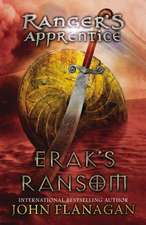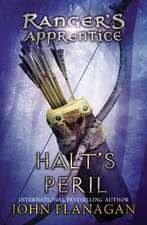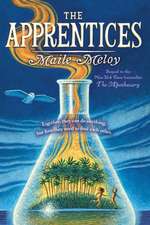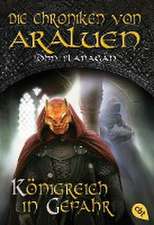The Emperor of Nihon-Ja: Ranger's Apprentice
Autor John Flanaganen Limba Engleză CD-Audio – 30 iun 2012
The international bestselling series with over 5 million copies sold in the U.S. alone!
Months have passed since Horace departed for the eastern nation of Nihon-Ja on a vital mission. Having received no communication from him, his friends fear the worst. Unwilling to wait a second longer, Alyss, Evanlyn, and Will leave their homeland behind and venture into an exotic land in search of their missing friend.
When they finally catch up with him, they find Horace entangled in a military coup. Determined to protect the imperial throne, Will and his band of Araluens must piece together and train a force in order to fend off the master Senji warriors intent on overthrowing the emperor.
Suspense and pulse-pounding action abound in this final adventure in the worldwide phenomenon that is Ranger's Apprentice.
Months have passed since Horace departed for the eastern nation of Nihon-Ja on a vital mission. Having received no communication from him, his friends fear the worst. Unwilling to wait a second longer, Alyss, Evanlyn, and Will leave their homeland behind and venture into an exotic land in search of their missing friend.
When they finally catch up with him, they find Horace entangled in a military coup. Determined to protect the imperial throne, Will and his band of Araluens must piece together and train a force in order to fend off the master Senji warriors intent on overthrowing the emperor.
Suspense and pulse-pounding action abound in this final adventure in the worldwide phenomenon that is Ranger's Apprentice.
Perfect for fans of J.R.R. Tolkien’s Lord of the Rings, T.H. White’s The Sword in the Stone, Christopher Paolini’s Eragon series, and George R.R. Martin’s Game of Thrones/A Song of Ice and Fire series.
| Toate formatele și edițiile | Preț | Express |
|---|---|---|
| Paperback (1) | 63.89 lei 6-8 săpt. | |
| Puffin Books – 29 feb 2012 | 63.89 lei 6-8 săpt. | |
| Hardback (1) | 118.94 lei 3-5 săpt. | |
| Penguin Books – 31 mar 2011 | 118.94 lei 3-5 săpt. |
Din seria Ranger's Apprentice
- 15%
 Preț: 43.26 lei
Preț: 43.26 lei - 15%
 Preț: 43.62 lei
Preț: 43.62 lei - 15%
 Preț: 43.89 lei
Preț: 43.89 lei - 13%
 Preț: 45.47 lei
Preț: 45.47 lei - 14%
 Preț: 45.02 lei
Preț: 45.02 lei - 13%
 Preț: 46.19 lei
Preț: 46.19 lei - 13%
 Preț: 46.07 lei
Preț: 46.07 lei - 14%
 Preț: 44.22 lei
Preț: 44.22 lei -
 Preț: 33.47 lei
Preț: 33.47 lei -
 Preț: 57.71 lei
Preț: 57.71 lei -
 Preț: 57.71 lei
Preț: 57.71 lei -
 Preț: 110.49 lei
Preț: 110.49 lei -
 Preț: 63.27 lei
Preț: 63.27 lei -
 Preț: 63.46 lei
Preț: 63.46 lei -
 Preț: 112.35 lei
Preț: 112.35 lei -
 Preț: 60.98 lei
Preț: 60.98 lei -
 Preț: 66.59 lei
Preț: 66.59 lei -
 Preț: 61.85 lei
Preț: 61.85 lei -
 Preț: 120.99 lei
Preț: 120.99 lei -
 Preț: 63.89 lei
Preț: 63.89 lei -
 Preț: 63.89 lei
Preț: 63.89 lei -
 Preț: 86.55 lei
Preț: 86.55 lei -
 Preț: 71.53 lei
Preț: 71.53 lei -
 Preț: 138.69 lei
Preț: 138.69 lei -
 Preț: 121.00 lei
Preț: 121.00 lei -
 Preț: 61.74 lei
Preț: 61.74 lei
Preț: 77.24 lei
Nou
Puncte Express: 116
Preț estimativ în valută:
14.78€ • 15.43$ • 12.23£
14.78€ • 15.43$ • 12.23£
Indisponibil temporar
Doresc să fiu notificat când acest titlu va fi disponibil:
Se trimite...
Preluare comenzi: 021 569.72.76
Specificații
ISBN-13: 9781743119013
ISBN-10: 1743119011
Dimensiuni: 136 x 124 x 13 mm
Greutate: 0.07 kg
Ediția:Unabridged ed
Editura: Bolinda Publishing
Colecția Ranger's Apprentice
Seria Ranger's Apprentice
ISBN-10: 1743119011
Dimensiuni: 136 x 124 x 13 mm
Greutate: 0.07 kg
Ediția:Unabridged ed
Editura: Bolinda Publishing
Colecția Ranger's Apprentice
Seria Ranger's Apprentice
Notă biografică
John Flanagan grew up in Sydney, Australia, hoping to be a writer. John began writing Ranger’s Apprentice for his son, Michael, ten years ago, and is still hard at work on the series and its spinoff, Brotherband Chronicles. He currently lives in the suburb of Manly, Australia, with his wife. In addition to their son, they have two grown daughters and four grandsons.
Descriere
Descriere de la o altă ediție sau format:
When Horace travels to the exotic land of Nihon-Ja, it isn't long before he finds himself pulled into a battle that is not his. A kingdom teeters on the edge of chaos when the Nihon-Ja emperor, a defender of the common man, is forcibly overthrown, and only Horace, Will, and his Araluen companions can restore the emperor to the throne.
When Horace travels to the exotic land of Nihon-Ja, it isn't long before he finds himself pulled into a battle that is not his. A kingdom teeters on the edge of chaos when the Nihon-Ja emperor, a defender of the common man, is forcibly overthrown, and only Horace, Will, and his Araluen companions can restore the emperor to the throne.
Extras
1
Toscana
“Avanti!”
The command rang out over the sun-baked earth of the parade ground and the triple files of men stepped out together. At each stride, their iron-nailed sandals hit the ground in perfect unison,
setting up a rhythmic thudding that was counterpointed by the irregular jingle of weapons and equipment as they occasionally rubbed or clattered together. Already, their marching feet were raising a faint cloud of dust in their wake.
“You’d certainly see them coming from quite a distance,” Halt murmured.
Will looked sidelong at him and grinned. “Maybe that’s the idea.”
General Sapristi, who had organized this demonstration of Toscan military techniques for them, nodded approvingly.
“The young gentleman is correct,” he said. Halt raised an eyebrow.
“He may be correct, and he is undoubtedly young. But he’s no gentleman.”
Sapristi hesitated. Even after ten days in their company, he was still not completely accustomed to the constant stream of cheerful insults that flowed between these two strange Araluens. It was difficult to know when they were serious and when they were speaking in fun. Some of the things they said to each other would be cause for mayhem and bloodshed between Toscans, whose pride was notoriously stronger than their sense of humor. He looked at the younger Ranger and noticed that he seemed to have taken no offense.
“Ah, Signor Halt,” he said uncertainly, “you are making a joke, yes?”
“He is making a joke, no,” Will said. “But he likes to think he is making a joke, yes.”
Sapristi decided it might be less confusing to get back to the point that the two Rangers had already raised.
“In any event,” he said, “we find that the dust raised by our soldiers can often cause enemies to disperse. Very few are willing to face our legions in open battle.”
“They certainly can march nicely,” Halt said mildly.
Sapristi glanced at him, sensing that the demonstration so far had done little to impress the gray-bearded Araluen. He smiled inwardly. That would change in a few minutes, he thought.
“Here’s Selethen,” Will said, and as the other two looked down, they could see the distinctively tall form of the Arridi leader climbing the steps of the reviewing platform to join them.
Selethen, representing the Arridi Emrikir, was in Toscana to negotiate a trade and military pact with the Toscan Senate. Over the years, the Toscans and Arridi had clashed intermittently, their countries separated only by the relatively narrow waters of the Constant Sea. Yet each country had items that the other needed. The Arridi had reserves of red gold and iron in their deserts that the Toscans required to finance and equip their large armies. Even more important, Toscans had become inordinately fond of kafay, the rich coffee grown by the Arridi.
The desert dwellers, for their part, looked to Toscana for woven cloth—the fine linen and cotton so necessary in the fierce desert heat—and for the excellent grade of olive oil the Toscans produced, which was far superior to their locally grown product. Plus there was a constant need to replenish and bring new breeding stock to their herds of sheep and goats. Animal mortality in the desert was high.
In the past, the two nations had fought over such items. But now, wiser heads prevailed, and they had decided that an alliance might be mutually beneficial for trade and for security. The waters of the Constant Sea were infested by corsairs in swift, small galleys. They swooped on merchant ships traveling between the two countries, robbing and sinking them.
Some in the region even looked back regretfully to the time when Skandian wolfships used to visit these waters. The Skandians had raided as well, but never in the numbers that were seen these days. And the presence of the Skandian ships had kept the number of local pirates down.
Nowadays, the Skandians were more law abiding. Their Oberjarl, Erak, had discovered that it was far more profitable to hire his ships out to other countries that needed to secure their national waters. As a result, the Skandians had become the de facto naval police in many
parts of the world. The Toscans and Arridi, with no significant naval forces of their own, had decided, as part of their agreement, to lease a squadron of wolfships to patrol the waters between their two coastlines.
All of which were the reasons why Halt and Will had spent the past ten days in Toscana. The longstanding enmity between the two countries, accompanied by the inevitable suspicion of the other’s intentions, had led both sides to agree to ask a third-party nation to act as arbitrator in the treaty that was being put in place. Araluen was a country trusted by both Arrida and Toscana. In addition, the Araluens had close ties with the Skandian Oberjarl, and it was felt that their intervention would be helpful in forming a relationship with the wild northern seamen.
It was logical for Selethen to suggest the inclusion of Halt and Will in the Araluen delegation. He had included Horace in the request as well, but duty had taken Horace elsewhere.
The actual wording and conditions of the treaty were not the concern of the two Rangers. They were simply here to escort the chief Araluen negotiator—Alyss Mainwaring, Will’s childhood sweetheart and one of the brighter new members of the Araluen Diplomatic Service.
She was presently locked away with the Arridi and Toscan lawyers, thrashing out the fine details of the agreement.
Selethen dropped gratefully into a seat beside Will. The three companies of Toscan legionnaires—thirty-three to a company, with an overall commander making up the traditional Toscan century of one hundred men—pivoted through a smart right turn below them, changing from a three-abreast formation to an extended eleven- abreast. In spite of the wider formation their lines were still geometrically perfect— straight as a sword blade, Will thought. He was about to voice the thought, and then he smiled. The simile wouldn’t be accurate so far as Selethen’s curved saber was concerned.
“How are the negotiations progressing?” Halt asked.
Selethen pursed his lips. “As all such things progress. My chamberlain is asking for a reduction of three-quarters of a percent on the duty to be charged for kafay. Your advocates,” he said, including Sapristiin the conversation, “are holding out for no more than five eighths of a percent. I had to have a break from it all. Sometimes I think they do this because they simply like to argue.”
Sapristi nodded. “It’s always the way. We soldiers risk our lives fighting while the lawyers quibble over fractions of a percentage point. And yet they look upon us as lesser beings.”
“How’s Alyss managing?” Will asked.
Selethen turned an approving look on him. “Your Lady Alyss is proving to be an island of calm and common sense in a sea of dispute. She is very, very patient—although I sense that she has been tempted to whack my chamberlain over the head with his sheaf of papers on several occasions.” He looked down at the three Toscan companies, now reforming into three files.
“A destra! Doppio di corsa! ”
The order was given by the century commander, who stood in the center of the parade ground. Instantly, the companies turned right, re-formed into three files, then broke into double-time, the thud of their sandals and the jingle of equipment sounding louder and more urgent with the increase in pace. The dust rose higher as well.
“General Sapristi,” Selethen asked, indicating the tight formations, “this precision drilling makes for quite a spectacle. But is there any real benefit to gain from it?”
“Indeed there is, Wakir. Our fighting methods depend on discipline and cohesion. The men in each century fight as one unit.”
“Once a battle begins, my men fight largely as individuals,” Selethen said. His voice indicated that he saw little value in this style of coordinated, almost machinelike maneuvering. “Of course, it’s the commander’s job to bring his forces into the most advantageous position on the field. But after that, I find it’s almost impossible to control them as individuals. Best to let them fight their own way.”
“That’s why all this drilling is necessary,” Sapristi replied. “Our men become accustomed to reacting to orders. It becomes instinctive. We teach them a few vital drills, and practice them over and over. It takes years to train an expert warrior. Constant drilling means we can have a legion ready to fight effectively in less than a year.”
“But they can’t possibly learn to be expert swordsmen in so short a time,” Will said questioningly.
Sapristi shook his head. “They don’t have to. Watch and learn, Ranger Will.”
“Alt! ” The command rang out and the three companies crashed to a stop as one.
“A cloud of dust and a line of statues,” Will mused. Across the parade ground, a trumpet blared and warriors began to appear from behind the buildings there. They moved quickly to form an extended line of battle—not as disciplined or as rigidly maintained as the century’s formation. They were armed with wooden practice swords—long-bladed swords, Will noticed, and round shields. Roughly one-quarter of them carried recurve bows in addition to their swords.
At a command, the “enemy” began to advance across the parade ground. The line undulated as some sections moved faster than others.
“Tre rige! ” shouted the century commander. Halt glanced a question at Sapristi.
“Form three ranks,” the general translated. “We don’t use the common tongue for field commands. No sense in letting the enemy know what you have in mind.”
“None at all,” Halt agreed mildly. Moving smoothly and without any undue haste, the three companies trotted into position, three ranks deep and thirty-three wide. The ranks were separated from one another by about a meter and a half.
The enemy force halted their advance some sixty meters from the rigid lines of legionnaires. The wild-looking enemy tribesmen brandished their weapons, and at a shouted command, those among them with bows stepped forward, arrows ready on the string. The observers heard the faint
sound of fifty arrows rasping against the bows as they were drawn back to the fullest extent. At the same time, the centurion called his counterorder.
“Tartaruga! Pronto! ”
Ninety-nine man-high, curved shields came around to the front, with a rattle of equipment.
“Tartaruga means ‘tortoise.’ ” Sapristi explained. “Pronto means
‘ready.’ ”
The enemy commander shouted an order and the archers released a ragged volley. As the first arrow sped away, the Toscan centurion bellowed:
“Azione! ”
“Action,” translated Sapristi.
Instantly, the soldiers reacted. The front rank crouched slightly, so that their shields covered them completely. The second and third ranks stepped close. The second rank raised their shields to head height, interlocking them with those of the front rank. The third rank did likewise. The hundred men of the century were now sheltered by a barricade of shields to the front and a roof of shields overhead. Seconds later, the volley of arrows clattered against them, bouncing off harmlessly.
“Just like a tortoise,” Will observed. “Who are the enemy?” “They’re all warriors from neighboring countries and provinces who have elected to join our empire,” Sapristi replied smoothly. Halt regarded him for a moment. “Did they elect to join?” he asked. “Or was the decision made for them?”
“Perhaps we helped a little with the decision-making process,” the Toscan general admitted. “In any event they are all skilled and experienced warriors, and we use them as auxiliaries and scouts. They are extremely useful for demonstrations of this kind. Watch now.”
The attacking force had stopped at the point from which they had fired the volley of arrows. The general pointed to where a group of orderlies were running onto the field, each one carrying a rough outline of a man cut from light wood. There were at least one hundred of them, Will estimated. He watched curiously as the men placed the upright targets in place, thirty meters from the front rank of the legionnaires.
“For the purpose of the demonstration,” Sapristi said, “we’ll assume that the enemy has reached this position in their advance. We don’t use real warriors for this part of the exercise. It’s too costly, and we need our auxiliaries.”
The orderlies, many of them glancing nervously at the still ranks of legionnaires, ran from the field once their targets were in position. Will leaned forward eagerly. “What happens now, General?” Sapristi allowed himself a small smile.
“Watch and see,” he said.
Toscana
“Avanti!”
The command rang out over the sun-baked earth of the parade ground and the triple files of men stepped out together. At each stride, their iron-nailed sandals hit the ground in perfect unison,
setting up a rhythmic thudding that was counterpointed by the irregular jingle of weapons and equipment as they occasionally rubbed or clattered together. Already, their marching feet were raising a faint cloud of dust in their wake.
“You’d certainly see them coming from quite a distance,” Halt murmured.
Will looked sidelong at him and grinned. “Maybe that’s the idea.”
General Sapristi, who had organized this demonstration of Toscan military techniques for them, nodded approvingly.
“The young gentleman is correct,” he said. Halt raised an eyebrow.
“He may be correct, and he is undoubtedly young. But he’s no gentleman.”
Sapristi hesitated. Even after ten days in their company, he was still not completely accustomed to the constant stream of cheerful insults that flowed between these two strange Araluens. It was difficult to know when they were serious and when they were speaking in fun. Some of the things they said to each other would be cause for mayhem and bloodshed between Toscans, whose pride was notoriously stronger than their sense of humor. He looked at the younger Ranger and noticed that he seemed to have taken no offense.
“Ah, Signor Halt,” he said uncertainly, “you are making a joke, yes?”
“He is making a joke, no,” Will said. “But he likes to think he is making a joke, yes.”
Sapristi decided it might be less confusing to get back to the point that the two Rangers had already raised.
“In any event,” he said, “we find that the dust raised by our soldiers can often cause enemies to disperse. Very few are willing to face our legions in open battle.”
“They certainly can march nicely,” Halt said mildly.
Sapristi glanced at him, sensing that the demonstration so far had done little to impress the gray-bearded Araluen. He smiled inwardly. That would change in a few minutes, he thought.
“Here’s Selethen,” Will said, and as the other two looked down, they could see the distinctively tall form of the Arridi leader climbing the steps of the reviewing platform to join them.
Selethen, representing the Arridi Emrikir, was in Toscana to negotiate a trade and military pact with the Toscan Senate. Over the years, the Toscans and Arridi had clashed intermittently, their countries separated only by the relatively narrow waters of the Constant Sea. Yet each country had items that the other needed. The Arridi had reserves of red gold and iron in their deserts that the Toscans required to finance and equip their large armies. Even more important, Toscans had become inordinately fond of kafay, the rich coffee grown by the Arridi.
The desert dwellers, for their part, looked to Toscana for woven cloth—the fine linen and cotton so necessary in the fierce desert heat—and for the excellent grade of olive oil the Toscans produced, which was far superior to their locally grown product. Plus there was a constant need to replenish and bring new breeding stock to their herds of sheep and goats. Animal mortality in the desert was high.
In the past, the two nations had fought over such items. But now, wiser heads prevailed, and they had decided that an alliance might be mutually beneficial for trade and for security. The waters of the Constant Sea were infested by corsairs in swift, small galleys. They swooped on merchant ships traveling between the two countries, robbing and sinking them.
Some in the region even looked back regretfully to the time when Skandian wolfships used to visit these waters. The Skandians had raided as well, but never in the numbers that were seen these days. And the presence of the Skandian ships had kept the number of local pirates down.
Nowadays, the Skandians were more law abiding. Their Oberjarl, Erak, had discovered that it was far more profitable to hire his ships out to other countries that needed to secure their national waters. As a result, the Skandians had become the de facto naval police in many
parts of the world. The Toscans and Arridi, with no significant naval forces of their own, had decided, as part of their agreement, to lease a squadron of wolfships to patrol the waters between their two coastlines.
All of which were the reasons why Halt and Will had spent the past ten days in Toscana. The longstanding enmity between the two countries, accompanied by the inevitable suspicion of the other’s intentions, had led both sides to agree to ask a third-party nation to act as arbitrator in the treaty that was being put in place. Araluen was a country trusted by both Arrida and Toscana. In addition, the Araluens had close ties with the Skandian Oberjarl, and it was felt that their intervention would be helpful in forming a relationship with the wild northern seamen.
It was logical for Selethen to suggest the inclusion of Halt and Will in the Araluen delegation. He had included Horace in the request as well, but duty had taken Horace elsewhere.
The actual wording and conditions of the treaty were not the concern of the two Rangers. They were simply here to escort the chief Araluen negotiator—Alyss Mainwaring, Will’s childhood sweetheart and one of the brighter new members of the Araluen Diplomatic Service.
She was presently locked away with the Arridi and Toscan lawyers, thrashing out the fine details of the agreement.
Selethen dropped gratefully into a seat beside Will. The three companies of Toscan legionnaires—thirty-three to a company, with an overall commander making up the traditional Toscan century of one hundred men—pivoted through a smart right turn below them, changing from a three-abreast formation to an extended eleven- abreast. In spite of the wider formation their lines were still geometrically perfect— straight as a sword blade, Will thought. He was about to voice the thought, and then he smiled. The simile wouldn’t be accurate so far as Selethen’s curved saber was concerned.
“How are the negotiations progressing?” Halt asked.
Selethen pursed his lips. “As all such things progress. My chamberlain is asking for a reduction of three-quarters of a percent on the duty to be charged for kafay. Your advocates,” he said, including Sapristiin the conversation, “are holding out for no more than five eighths of a percent. I had to have a break from it all. Sometimes I think they do this because they simply like to argue.”
Sapristi nodded. “It’s always the way. We soldiers risk our lives fighting while the lawyers quibble over fractions of a percentage point. And yet they look upon us as lesser beings.”
“How’s Alyss managing?” Will asked.
Selethen turned an approving look on him. “Your Lady Alyss is proving to be an island of calm and common sense in a sea of dispute. She is very, very patient—although I sense that she has been tempted to whack my chamberlain over the head with his sheaf of papers on several occasions.” He looked down at the three Toscan companies, now reforming into three files.
“A destra! Doppio di corsa! ”
The order was given by the century commander, who stood in the center of the parade ground. Instantly, the companies turned right, re-formed into three files, then broke into double-time, the thud of their sandals and the jingle of equipment sounding louder and more urgent with the increase in pace. The dust rose higher as well.
“General Sapristi,” Selethen asked, indicating the tight formations, “this precision drilling makes for quite a spectacle. But is there any real benefit to gain from it?”
“Indeed there is, Wakir. Our fighting methods depend on discipline and cohesion. The men in each century fight as one unit.”
“Once a battle begins, my men fight largely as individuals,” Selethen said. His voice indicated that he saw little value in this style of coordinated, almost machinelike maneuvering. “Of course, it’s the commander’s job to bring his forces into the most advantageous position on the field. But after that, I find it’s almost impossible to control them as individuals. Best to let them fight their own way.”
“That’s why all this drilling is necessary,” Sapristi replied. “Our men become accustomed to reacting to orders. It becomes instinctive. We teach them a few vital drills, and practice them over and over. It takes years to train an expert warrior. Constant drilling means we can have a legion ready to fight effectively in less than a year.”
“But they can’t possibly learn to be expert swordsmen in so short a time,” Will said questioningly.
Sapristi shook his head. “They don’t have to. Watch and learn, Ranger Will.”
“Alt! ” The command rang out and the three companies crashed to a stop as one.
“A cloud of dust and a line of statues,” Will mused. Across the parade ground, a trumpet blared and warriors began to appear from behind the buildings there. They moved quickly to form an extended line of battle—not as disciplined or as rigidly maintained as the century’s formation. They were armed with wooden practice swords—long-bladed swords, Will noticed, and round shields. Roughly one-quarter of them carried recurve bows in addition to their swords.
At a command, the “enemy” began to advance across the parade ground. The line undulated as some sections moved faster than others.
“Tre rige! ” shouted the century commander. Halt glanced a question at Sapristi.
“Form three ranks,” the general translated. “We don’t use the common tongue for field commands. No sense in letting the enemy know what you have in mind.”
“None at all,” Halt agreed mildly. Moving smoothly and without any undue haste, the three companies trotted into position, three ranks deep and thirty-three wide. The ranks were separated from one another by about a meter and a half.
The enemy force halted their advance some sixty meters from the rigid lines of legionnaires. The wild-looking enemy tribesmen brandished their weapons, and at a shouted command, those among them with bows stepped forward, arrows ready on the string. The observers heard the faint
sound of fifty arrows rasping against the bows as they were drawn back to the fullest extent. At the same time, the centurion called his counterorder.
“Tartaruga! Pronto! ”
Ninety-nine man-high, curved shields came around to the front, with a rattle of equipment.
“Tartaruga means ‘tortoise.’ ” Sapristi explained. “Pronto means
‘ready.’ ”
The enemy commander shouted an order and the archers released a ragged volley. As the first arrow sped away, the Toscan centurion bellowed:
“Azione! ”
“Action,” translated Sapristi.
Instantly, the soldiers reacted. The front rank crouched slightly, so that their shields covered them completely. The second and third ranks stepped close. The second rank raised their shields to head height, interlocking them with those of the front rank. The third rank did likewise. The hundred men of the century were now sheltered by a barricade of shields to the front and a roof of shields overhead. Seconds later, the volley of arrows clattered against them, bouncing off harmlessly.
“Just like a tortoise,” Will observed. “Who are the enemy?” “They’re all warriors from neighboring countries and provinces who have elected to join our empire,” Sapristi replied smoothly. Halt regarded him for a moment. “Did they elect to join?” he asked. “Or was the decision made for them?”
“Perhaps we helped a little with the decision-making process,” the Toscan general admitted. “In any event they are all skilled and experienced warriors, and we use them as auxiliaries and scouts. They are extremely useful for demonstrations of this kind. Watch now.”
The attacking force had stopped at the point from which they had fired the volley of arrows. The general pointed to where a group of orderlies were running onto the field, each one carrying a rough outline of a man cut from light wood. There were at least one hundred of them, Will estimated. He watched curiously as the men placed the upright targets in place, thirty meters from the front rank of the legionnaires.
“For the purpose of the demonstration,” Sapristi said, “we’ll assume that the enemy has reached this position in their advance. We don’t use real warriors for this part of the exercise. It’s too costly, and we need our auxiliaries.”
The orderlies, many of them glancing nervously at the still ranks of legionnaires, ran from the field once their targets were in position. Will leaned forward eagerly. “What happens now, General?” Sapristi allowed himself a small smile.
“Watch and see,” he said.

















